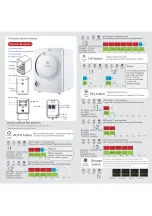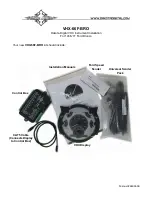
Describing the PCS2 Device Components
2-19
P/N 85266-30, Manual revision: A
Procedure statistics area
The lower portion of the screen communicates data to the operator concerning
specific measurements and calculations made by the system during a PCS2
collection procedure. These statistics are updated throughout a procedure and
concern the following component functions:
z
Blood pump speed during the DRAW and RETURN modes.
z
Amount of the plasma contained in the collection container.
z
Cuff pressure registered for the donor (mmHg).
z
Saline solution volume infused (if selected) during the procedure.
z
Volume processed (ml).
Mode control
keys
These keys, located directly below the PCS2 display screen, are used to regulate
the operating state (or mode) of a PCS2 collection procedure.
PRIME key
This key is used to initiate the PRIME mode. The PRIME mode will bring antico-
agulant solution from the anticoagulant line tubing into the donor- line tubing.
DRAW key
This key is used to initiate the DRAW mode. The DRAW mode will move anti-
coagulated whole blood from the donor through the donor-line tubing into the
centrifuge bowl, where plasmapheresis will be initiated.
RETURN key
This key is used to initiate, or resume, the RETURN mode. During automated
procedure functioning, a Return cycle is automatically initiated. However this
key can be used to provide an early return of the bowl contents to the donor, if
necessary.
STOP key
This key is used to immediately stop the centrifuge and pumps.
Caution:
If the STOP KEY has been used during a Draw cycle, the bowl contents
should be
returned
to the donor before resuming the collection procedure.
Stopping the procedure during the DRAW mode could affect the separation of the
blood components in the bowl. This could eventually interfere with the quality
of the final collection product (and/or the collection procedure).
Protocol key
This key is used to select certain PCS2 procedures and any options. Further infor-
mation in provided in the chapter “Performing a PCS2 Collection Procedure”.
















































